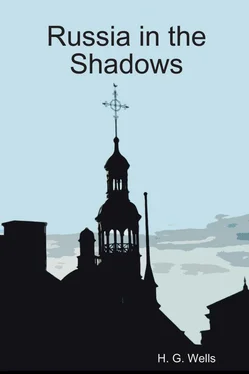It is necessary that we should understand and respect the professions and principles of the Bolsheviks if we Western peoples are to be of any effectual service to humanity in Russia. Hitherto these professions and principles have been ignored in the most extraordinary way by the Western Governments. The Bolshevik Government is, and says it is, a Communist Government. And it means this, and will make this the standard of its conduct. It has suppressed private ownership and private trade in Russia, not as an act of expediency but as an act of right; and in all Russia there remain now no commercial individuals and bodies with whom we can deal who will respect the conventions and usages of Western commercial life. The Bolshevik Government, we have to understand, has, by its nature, an invincible prejudice against individual business men; it will not treat them in a manner that they will consider fair and honourable; it will distrust them and, as far as it can, put them at the completest disadvantage. It regards them as pirates—or at best as privateers. It is hopeless and impossible therefore for individual persons and firms to think of going into Russia to trade. There is only one being in Russia with whom the Western world can deal, and that is the Bolshevik Government itself, and there is no way of dealing with that one being safely and effectually except through some national or, better, some international Trust. This latter body, which might represent some single Power or group of Powers, or which might even have some titular connection with the League of Nations, would be able to deal with the Bolshevik Government on equal terms. It would have to recognise the Bolshevik Government and, in conjunction with it, to set about the now urgent task of the material restoration of civilised life in European and Asiatic Russia. It should resemble in its general nature one of the big buying and controlling trusts that were so necessary and effectual in the European States during the Great War. It should deal with its individual producers on the one hand, and the Bolshevik Government would deal with its own population on the other. Such a Trust could speedily make itself indispensable to the Bolshevik Government. This indeed is the only way in which a capitalist State can hold commerce with a Communist State. The attempts that have been made during the past year and more to devise some method of private trading in Russia without recognition of the Bolshevik Government were from the outset as hopeless as the search for the North-West passage from England to India. The channels are frozen up.
Any country or group of countries with adequate industrial resources which goes into Bolshevik Russia with recognition and help will necessarily become the supporter, the right hand, and the consultant of the Bolshevik Government. It will react upon that Government and be reacted upon. It will probably become more collectivist in its methods, and, on the other hand, the rigours of extreme Communism in Russia will probably be greatly tempered through its influence.
The only Power capable of playing this rôle of eleventh-hour helper to Russia single-handed is the United States of America. That is why I find the adventure of the enterprising and imaginative Mr. Vanderlip very significant. I doubt the conclusiveness of his negotiations; they are probably only the opening phase of a discussion of the Russian problem upon a new basis that may lead it at last to a comprehensive world treatment of this situation. Other Powers than the United States will, in the present phase of world-exhaustion, need to combine before they can be of any effective use to Russia. Big business is by no means antipathetic to Communism. The larger big business grows the more it approximates to Collectivism. It is the upper road of the few instead of the lower road of the masses to Collectivism.
The only alternative to such a helpful intervention in Bolshevik Russia is, I firmly believe, the final collapse of all that remains of modern civilisation throughout what was formerly the Russian Empire. It is highly improbable that the collapse will be limited to its boundaries. Both eastward and westward other great regions may, one after another, tumble into the big hole in civilisation thus created. Possibly all modern civilisation may tumble in.
These propositions do not refer to any hypothetical future; they are an attempt to state the outline facts and possibilities of what is going on—and going on with great rapidity—in Russia and in the world generally now, as they present themselves to my mind. This in general terms is the frame of circumstance in which I would have the sketches of Russia that have preceded this set and read. So it is I interpret the writing on the Eastern wall of Europe.
THE END
I saw one passenger steamboat on the Neva crowded with passengers. Usually the river was quite deserted except for a rare Government tug or a solitary boatman picking up drift timber.


